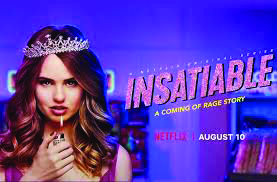Netflix’s “Insatiable” misses the mark

Star of “Explained”, Debby Ryan, portrays a teenager struggling with body-image issues.
August 27, 2018
Weeks before the August 10 release date, Netflix’s “Insatiable” received backlash for its ignorant depiction of current issues. The seemingly tone-deaf deployment of sexual harassment, false accusations, and racial stereotypes unsettled viewers. These representations seemed to be intended for comedy, but instead, they came off as offensive.
Almost 300,000 people have signed a petition for the show’s cancellation in response to the trailer. The petition, started by Florence Given on “Change.org”, has almost reached its goal.
The series follows Patty Bladell, played by Debby Ryan, in a lazy portrayal of an overweight teenager suffering from body-image issues. Not only was the plot insensitive, but the amount of red-flags in the first episode is astounding. In the pilot episode, Patty, also known as “Fatty Patty” by her classmates, spends her time binge-eating in order to compensate for her sadness. This portrays the stereotype that overweight people are uncomfortable with their bodies, and are constantly eating to make up for their sadness. After being punched in the face by a homeless person, Patty has her jaw wired shut and is on a three-month juice diet. This turns into the miracle she needs in order to change her appearance drastically.
After the three months on a juice diet and a wired jaw, Debby Ryan removes the fat suit to depict the new and seemingly improved Patty. She sets out to seek revenge on those who thought she was a loser by entering beauty pageants. Not only does this depict that you have to be physically beautiful in order to fit in, but it shows that using your body to your advantage to prove yourself is acceptable.
The underlying message is quite unsettling- you have to get injured or be physically impaired in order to lose the pounds that everyone makes fun of.
Minutes into the pilot episode, characters are falsely accused of molestation, immediately ruining their lives. This message takes away from the impact and makes light of the serious #MeToo movement.
Overall, the inconsiderate jokes, storyline, and characters damage the show beyond repair. Turning the #MeToo movement into a light situation angered many viewers, and it will continue to do so. The scathing reviews it has received give the show a negative stigma that will harm its potential views. Insatiable perpetuates the objectification of women’s bodies in a toxic and sinister way.
The show’s creator, Lauren Gussis, has assured audiences many times that the show is intended to be satire, but it misses the mark in this day and age.





